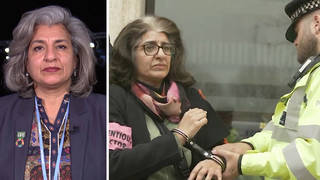
Guests
- Jason Boxprofessor in glaciology at the Geological Survey of Denmark and Greenland. He has been studying the Greenland ice sheet since 1994.
Leading glaciologist Jason Box was an expert witness in a mock trial of Exxon held at COP21, which examined how the oil giant concealed its own findings dating back to the 1970s that fossil fuels cause global warming, alter the climate and melt the Arctic ice. “They take a public position that is counter to their own science, is in effect lying in public on issues just to keep their product sellable. That cost us 20 years,” Box says. “If they had come straight and recognized themselves as an energy company, they could have made that transition with us to cleaner energy and remained a viable company. Now they’re a rogue company.”
Transcript
AMY GOODMAN: Let me ask you, Jason Box, as a leading glaciologist, scientist, about ExxonMobil and about this exposé done by Los Angeles Times and InsideClimate News that shows these documents that Exxon knew in the 1970s, taking—working with top scientists, about climate change. Last weekend, you participated in a very novel kind of mock trial. The prosecutors were author Naomi Klein and 350.org co-founder Bill McKibben. And you talked about the significance of these new documents that have come out. Explain why we know what Exxon knew but then covered up.
JASON BOX: I mean, my participation was as an expert witness. And I read the early scientific documents as part of this InsideClimate News revelations, this exposé. The clarity of the science that Exxon was producing in the early ’80s is crystal clear. The technologies they were using, that climate science was state-of-the-art. It still rivals some of the science we have today. And for Exxon to then take a public position and a position with their shareholders that was not consistent with their very carefully worked-out science—
AMY GOODMAN: Why were they doing this science? Why—did they say, “We want to know about the state of climate change”?
JASON BOX: The reporting is clear that their leaders in the ’70s took this risk factor seriously, because it risks their business model. And so they wanted to know, using their own people, and they were very well funded. And the documents are very well-written climate science. They then connected that with their product could not be sold anymore. They could not convince shareholders that their product was viable. But they went ahead and lied to the public, and they lied to their shareholders.
AMY GOODMAN: How?
JASON BOX: By—well, by flatly denying it and by using uncertainty. They brought the rhetoric of uncertainty into their messaging from their CEO to the shareholders and to the public.
AMY GOODMAN: What happened to the scientific team that they hired to research this?
JASON BOX: Yeah, they defunded their science, that—there was an economic crisis at the time, that they justified some of that defunding. But then they take a public position that is counter to their own science, is in effect lying in public on issues, you know, just to keep their product sellable. And that cost us 20 years, you know? And if they had come straight and recognized themselves as an energy company, they could have made that transition with us to cleaner energy and remained a viable company. Now they’re a rogue company.
AMY GOODMAN: The results of that cover-up?
JASON BOX: Well, it’s—we made this mock trial. And what clearly needs to happen is that the true justice comes to this issue, that, you know, climate change is—it’s a justice issue, it’s an environmental justice issue. And this couldn’t be a more clear case.
AMY GOODMAN: Finally, what keeps your spirits up, when you see what is happening? The Esquire subtitle, “Among many climate scientists, gloom has set in. Things are worse than we think, but they can’t really talk about it.” Do you see self-censorship among scientists? And what gives you hope here?
JASON BOX: Well, I’m actually not wanting to be a messenger of doom, because I see a lot of hope in the explosive growth in renewables and the fact that renewables are cheaper than nuclear, they’re cheaper than fossil fuels in many existing markets around the world, and that that growth is going to surprise a lot of people, how clean energy just takes over because it’s better economically. I see that coming. That gives me hope. I sense, actually, in this meeting, how broad this movement is becoming, the awareness of this problem. And it’s broadening, so it’s gaining momentum. And I think that momentum will continue through Paris. There’s a lot of hard work to do. It’s not going to be easy, but we’re doing this for our kids and for nature.
AMY GOODMAN: Jason Box, I want to thank you for being with us, professor of glaciology at the Geological Survey of Denmark and Greenland. He’s been studying the Greenland ice sheet since 1994.













Media Options